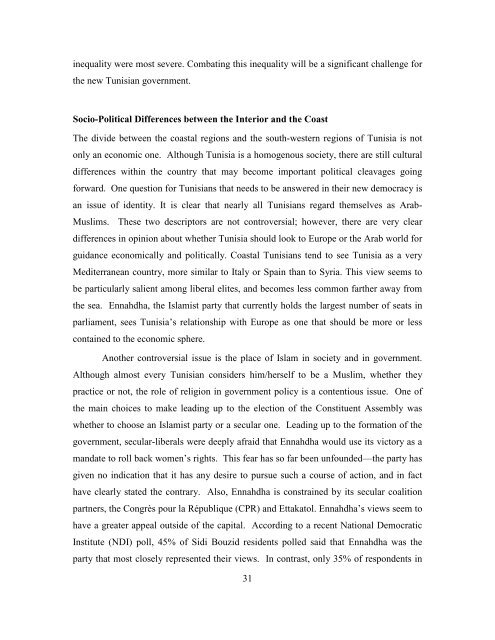Tunisia: Understanding Conflict 2012 - Johns Hopkins School of ...
Tunisia: Understanding Conflict 2012 - Johns Hopkins School of ...
Tunisia: Understanding Conflict 2012 - Johns Hopkins School of ...
Create successful ePaper yourself
Turn your PDF publications into a flip-book with our unique Google optimized e-Paper software.
inequality were most severe. Combating this inequality will be a significant challenge for<br />
the new <strong>Tunisia</strong>n government.<br />
Socio-Political Differences between the Interior and the Coast<br />
The divide between the coastal regions and the south-western regions <strong>of</strong> <strong>Tunisia</strong> is not<br />
only an economic one. Although <strong>Tunisia</strong> is a homogenous society, there are still cultural<br />
differences within the country that may become important political cleavages going<br />
forward. One question for <strong>Tunisia</strong>ns that needs to be answered in their new democracy is<br />
an issue <strong>of</strong> identity. It is clear that nearly all <strong>Tunisia</strong>ns regard themselves as Arab-<br />
Muslims. These two descriptors are not controversial; however, there are very clear<br />
differences in opinion about whether <strong>Tunisia</strong> should look to Europe or the Arab world for<br />
guidance economically and politically. Coastal <strong>Tunisia</strong>ns tend to see <strong>Tunisia</strong> as a very<br />
Mediterranean country, more similar to Italy or Spain than to Syria. This view seems to<br />
be particularly salient among liberal elites, and becomes less common farther away from<br />
the sea. Ennahdha, the Islamist party that currently holds the largest number <strong>of</strong> seats in<br />
parliament, sees <strong>Tunisia</strong>’s relationship with Europe as one that should be more or less<br />
contained to the economic sphere.<br />
Another controversial issue is the place <strong>of</strong> Islam in society and in government.<br />
Although almost every <strong>Tunisia</strong>n considers him/herself to be a Muslim, whether they<br />
practice or not, the role <strong>of</strong> religion in government policy is a contentious issue. One <strong>of</strong><br />
the main choices to make leading up to the election <strong>of</strong> the Constituent Assembly was<br />
whether to choose an Islamist party or a secular one. Leading up to the formation <strong>of</strong> the<br />
government, secular-liberals were deeply afraid that Ennahdha would use its victory as a<br />
mandate to roll back women’s rights. This fear has so far been unfounded—the party has<br />
given no indication that it has any desire to pursue such a course <strong>of</strong> action, and in fact<br />
have clearly stated the contrary. Also, Ennahdha is constrained by its secular coalition<br />
partners, the Congrès pour la République (CPR) and Ettakatol. Ennahdha’s views seem to<br />
have a greater appeal outside <strong>of</strong> the capital. According to a recent National Democratic<br />
Institute (NDI) poll, 45% <strong>of</strong> Sidi Bouzid residents polled said that Ennahdha was the<br />
party that most closely represented their views. In contrast, only 35% <strong>of</strong> respondents in<br />
31
















